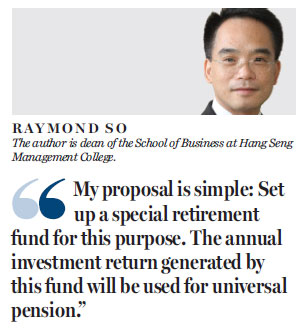Financially sustainable fund needed to tackle pension issue
Updated: 2016-03-17 08:51
By Raymond so(HK Edition)
|
|||||||||
The consultation on universal retirement protection is well underway. But so far no consensus has been reached. According to a survey conducted by a local university recently, 51 percent of respondents now support an unrestricted universal retirement protection program while 49 percent oppose it. When errors in estimates are considered, the supporters are almost level with the opponents. This means that the issue is indeed a controversial one characterized by sharply divided opinions. This situation is not helpful for discussions on the issues - let alone in reaching a consensus.
For those who support universal retirement, it is simply a matter of social justice. When the elderly people were still young, they worked hard for the development of Hong Kong. They contributed significantly to the SAR's prosperity. It is not unreasonable to support them when they are in their old age. Enabling the elderly to live with dignity and security is by no means demanding, particularly considering Hong Kong is such an affluent society. From this point of view, I would not have any objection to a universal retirement system. I would also add that the current request of a mere HK$3,000 a month is not enough to support the elderly.
For those opposed to the idea of universal retirement income, their greatest concern is where the money to pay for it will come from. This is always the most important consideration in regard to social policy, as understandably such expenditure can easily rise. While the problem of a growing aging population is a significant one, a universal retirement scheme without a means test is not really sustainable. For me, as long as a solution to financing it can be found, a broadly universal retirement scheme can be implemented. If we just talk about basic needs without considering the impact on public finances then we are ignoring reality. In other words, a sound financial plan is essential to a workable retirement scheme.
Some people have argued that the government spends a lot of money on education and medical services - which are considered universal rights of Hong Kong people. But why are retirement benefits not included among these rights? We have to bear in mind that expenditure on education and healthcare can be considered as a social investment. This is because education helps improve society's overall productivity. Health services also contribute to the future development of Hong Kong. But providing universal retirement benefits will place a great burden on society; from a financial point of view, "social productivity" will not increase.
How can we come to a compromise - that is, having a financially viable universal retirement scheme? I believe if it really is financial concerns that prevent a universal retirement scheme being implemented, the real solution lies in it having one which is financially sustainable.
So my proposal is simple: Set up a special retirement fund for this purpose. The annual investment return generated by this fund will be used for universal pension. In the pursuit of prudent financial management, annual spending is determined by the annual income generated by the fund. In other words, there should not be any erosion of the capital of the retirement fund. This will make the fund sustainable.
Similar proposals have been previously suggested by other people. But those proposals involved raising taxes, changes in contributions to the Mandatory Provident Fund and other controversial measures. Together with a fixed or ever increasing monthly stipend, all these features make the financial viability of a retirement fund questionable. If no fixed monthly retirement stipend is offered, people may worry about the viability of regular monthly pension payments as the fund could suffer investment losses. From a theoretical point of view, this is a valid concern. But the fund can be invested in the Principal Protected Plans under the management of the Hong Kong Monetary Authority - which are basically risk free. There is the chance that variations in monthly stipends will occur, due to volatility in returns generated by the fund. But this little inconvenience is worth it - as we will have a sustainable retirement fund for generations as a reward.
Of course, the size of the fund must not be too small. A very rough estimate is that the fund's size will have to be at least HK$200 billion. Given this huge size, this idea cannot be implemented immediately. It takes time to accumulate such a fund. In order for the government to deploy resources to the fund, society would therefore have to be prepared to receive fewer tax concessions from the government in future budgets.

(HK Edition 03/17/2016 page10)